| Gemstone Chart |
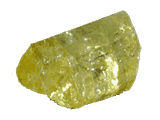 Natural Apatite Natural Apatite
Apatite displays strong fluorescence under short wave ultra-violet light. There is a particularly intense and deeply saturated, geenish-blue (aka swiss blue) variety from Madagascar known as "Neon Apatite" that is becoming quite popular in the gem trade.
Color: yellow, green, below, violet
Categories: semi-precious stone
Chemical Composition: Phosphate group
Crystal Group: Hexagonal
Refractive Index: 1.63-1.64
Hardness: 5
Density: 3.17-3.23
Occurrence: Burma, Ceylon, Madagascar, Mexico, Canada, India
| 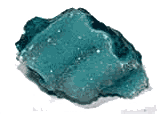 Natural Chrysocolla Quartz Natural Chrysocolla Quartz
Chrysocolla quartz is chalcedony mixed with varying amounts of chrysocolla. The chrysocolla provides the robin's egg blue coloration, and the quartz provides sufficient hardness for use in jewelry.
Color: green, blue, white
Categories: semi-precious stone
Chemical Composition: SiO2
Crystal Group: Hexagonal
Refractive Index: 1.544 - 1.553
Hardness: 7
Density: 2.66
Occurrence: Arizona, Mexico
| 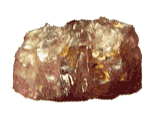 Natural Color Change Sapphire Natural Color Change Sapphire
A rare variety of sapphire, known as color changing sapphire, exhibits different colors in different light. A color change sapphire is blue in natural light, and violet in artificial light. A similar effect is also seen in alexandrite.
Color: Color changing blue to purple, greenish brown to red
Categories: semi-precious stone
Chemical Composition: AL22O3
Crystal Group: Hexagonal
Refractive Index: 1.759-1.778
Hardness: 9
Density: 4
Occurrence: Ceylon, East Africa
| 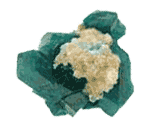 Natural Dioptase Natural Dioptase
Dioptase is an intense emerald-green to bluish-green copper cyclosilicate mineral.Dioptase is a rather unusual gemstone that will rarely be found in your basic jewelry stores. It is a beautiful gemstone with a very unusual combination of green colors.
Color: Dark blue green, emerald green, or turquoise
Categories: semi-precious stone
Chemical Composition: CuSiO2(OH) 2
Crystal Group: Hexagonal
Refractive Index: RI 1.644 ĘC 1.709
Hardness: 5
Density: 3.28 ĘC 3.55
Occurrence: Russia, Tsumeb Namibia, California and Colorado USA, Congo, Zaire, Chile
| 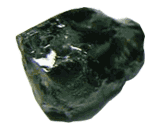 Natural Indicolite Natural Indicolite
Indicolite is a very beautiful stone which is also known as "Blue Tourmaline". It is much different from the other gemstones found in the world.
Indicolite is one of the rarer varieties of elbaite.
Color: Blue
Categories: semi-precious stone
Chemical Composition: (NaCa)(LI,MgFe,Al)9B3Si6(O,OH)31
Crystal Group: Hexagonal
Refractive Index: 1.624(+.005, -.005) - 1.644(+.006, -.006)
Hardness: 7-7.5
Density: 3.06 (.05, +.15)
Occurrence: Brazil, Namibia, U.S.A.
| 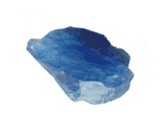 Natural Sapphire Natural Sapphire
Sapphire is a gemstone variety of the mineral corundum,Blue is the main colour of the sapphire. Its beauty, its magnificent colours, its transparency, but also its constancy and durability are qualities associated with this gemstone by gemstone lovers and specialists alike.Fancy sapphires are pure individualism and are just made for lovers of individualistic coloured stone jewellery. They are currently available in a positively enchanting variety of designs - as ring stones, necklace pendants or ear jewellery.
Color: blue, bluish purple, bluish violet, greenish yellow, orangy yellow, purple, red, reddish orange, red-orange or orange-red, reddish purple, red-purple or purple-red, slightly purplish red, violet, violetish blue, yellow, yellowish orange, pink
Categories: precious stone
Chemical Composition: AL22O3
Crystal Group: Hexagonal
Refractive Index: 1.759-1.778
Hardness: 9
Density: 4
Occurrence: Sri Lanka, Burma, India, Kenya, Tanzania, Madagascar, Thailand, U.S.A., China
| 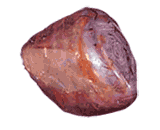 Natural Star Sapphire Natural Star Sapphire
A star sapphire is a lovely gem that exhibits a six pointed star because of the intersection of six thin intersecting inclusions. When the gem is lit from above, the inclusions become quite visible and the star shape appears.A powdery grey-blue star sapphire is the centerpiece of a ring from the Art Deco period.
Color: Blue, green blue, violet, blue, black, brown, pink.
Categories: semi-precious stone
Chemical Composition: AL2O3
Crystal Group: Hexagonal
Refractive Index: 1.759-1.778
Hardness: 9
Density: 4
Occurrence: Sri Lanka, Burma, India, East Africa, Ankarana-Madagascar, Thailand.
| 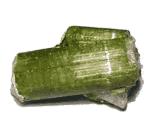 Natural Tourmaline Natural Tourmaline
Tourmaline is actually a group of several different minerals which have similar crystal structures, but complex and variable chemical formulas. Tourmaline is the most varicolored of all gemstones. It occurs in all colors, but red, green, and multicolored are its most famous gem colors.
Color: blue, bluish green, green, greenish blue, green-blue or blue-green, greenish yellow, orangy red, red, red-orange or orange-red, red-purple or purple-red, slightly purplish red, slightly yellowish green, strongly purplish red, strongly yellowish green, very slightly bluish green, yellowish green, yellow-green or green-yellow, colorless, brown, pink
Categories: semi-precious stone
Chemical Composition: (NaCa)(LI,MgFe,Al)9B3Si6(O,OH)31
Crystal Group: Hexagonal
Refractive Index: 1.624(+.005, -.005) - 1.644(+.006, -.006)
Hardness: 7-7.5
Density: 3.06 (.05, +.15)
Occurrence: Brazil, East Africa, Nigeria, Madagascar, U.S.A.
|
|
